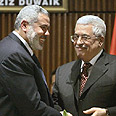A more detached, artificial and absurd word combination than "Palestinian unity" could not possibly be heard throughout the Territories. Palestinian society is deteriorating, a process which apparently began at the end of the first Intifada and was accelerated with the arrival of PLO exiles to the region within the framework of the Oslo Accords.
Until then the Palestinians were only divided into the traditional "mountain population" and the newer "population of the plain." Suddenly new population definitions popped up: The "Gazans" as opposed to the "West Bankers," "Tunis hedonists," (PLO representatives who returned from abroad) as opposed to the "victims of the Territories" (those who experienced the Israeli occupation and held on to the land.)
Hamas' later appearance along with its social achievements, amid the failures of the PLO leadership, created an additional rift within this society.
The sectarian divisions prevalent throughout the Territories go far beyond political disputes, much further than ideological or social conflicts. It is true hostility. Therefore, the fiasco of the Palestinian unity government is reminiscent of a term taken from American football: "TV timeout." When the conflict reaches a climax an artificial timeout is announced; it is not crucial and has no justification other than the desire of the "sponsors" to exploit the tension to increase their profits from advertising.
The current mood in the Territories is that this "unity government" was established as a result of heavy pressure exerted by two key elements: Saudi Arabia and the West.
Pathetic development
Saudi Arabia is one of the world's most corrupt countries and it is trying to secure a leadership role in the Arab world on account of its money alone. It's the same Saudi Arabia that during the al-Aqsa Intifada encouraged suicide bombers on buses by generously supporting their families. Now it’s not just the families of the suicide bombers who will benefit, but the Palestinian leadership. Neither Mahmoud Abbas nor Ismail Haniyeh would be able to turn down large sums of money guaranteed by the Saudi Kingdom. These sums were worth the artificial "timeout" for a photo-op with King Abdullah.
Many Palestinians view this development as pathetic, since the bond between Abbas and Haniyeh falls far below that between Abbas and Olmert. Khaled Mashaal and Muhammad Dahlan are dying to eulogize each other, but the Saudis demanded that they "establish a ticking, hostile coalition."
The other factor stirring the pot is the West, which is encouraging the Palestinians to "Westernize" politically. In his renowned book "Orientalism" the Palestinian intellectual Edward Said accused the West of misreading the East and in distorting the picture to serve its own needs. The West failed to read the Palestinian map and encouraged "democratic elections," which brought Hamas to power. Again, it's the same West that believes that the "unity government" is the natural outcome of the democratization process that has seemingly swept the Territories.
This forced "timeout" artificially halted an open score, which is expected to be settled in the near future. The motivation to resume hostilities between Fatah and Hamas has not subsided, while street riots between families, factions and sects are likely to be resumed at any moment, perhaps with even greater vigor.
Moshe Elad is a researcher at the Shmuel Neeman Institute at the Technion
















